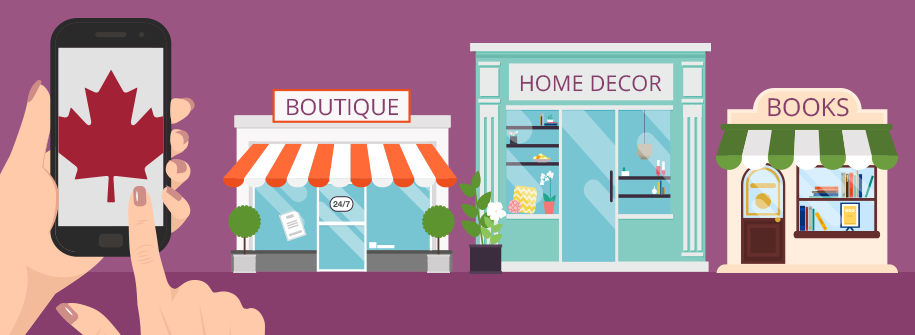Buying local has been a significant trend for a while. More and more consumers are committed to reducing their environmental footprint and supporting their local economy. Products designed, manufactured, distributed and sold by local providers are enjoying growing popularity—a reflection of many people’s changing values. Governments are also demonstrating their concern over the reliability of global supply chains. In fact, in the past few years, they have commissioned studies and launched a number of programs to encourage local buying for greater collective self-sufficiency.
But recently we entered a whole new ball game: a raging pandemic, cities under lockdown, borders closed. As healthcare authorities struggled to procure enough medical supplies and protective equipment, we began to fear shortages of all imported food or other essential goods. Never before had we directly witnessed the hazards of international trade. On top of our own ethical issues, we felt a sense of dire economic urgency that made buying local a priority. Who could forget the emotional response that swept through our communities?
Mass media and trusted online sources helped us discover local products and suppliers we’d never heard of—in our neighbourhoods, our cities and surrounding areas. More and more businesses started offering takeout and home delivery, much to our relief. No wonder so many of us changed our buying habits and providers. And it went far beyond convenience: we heard our elected officials’ appeals loud and clear and were driven by genuine social consciousness. Each of us understood our power and duty to protect hard-hit local economies.
Is it a long-term trend?
Some producers and businesses saw their local sales reach three, five or even ten times pre-COVID levels. But once the initial insecurity subsides, can we expect this trend to continue?
Buying local has already gained considerable ground since March. And despite the gradual “reopening” that started in May, we’re bombarded with warnings that a second wave could soon hit us. Safety restrictions aren’t about to be lifted. The infamous coronavirus could come back in cycles, or even stick around for good like the flu. As a result, many people are finding safe new ways to manage over the long term. On a broader scale, Canada’s economic recovery won’t happen overnight and will probably call for public policies to further encourage local purchasing.
Let’s face it: life isn’t the same anymore. Millions of us will think and act differently for a long time. Product and service providers face an altered business environment where marketing, communications and distribution challenges have changed. Fortunately, there is no shortage of business opportunities.
Defining local to better redefine it
For most people, supporting (or saving) their own neighbourhood’s favourite businesses logically came first. But their sense of community soon extended to regional providers. Then, a few weeks into the lockdown, government messages led scores of consumers to equate local with provincial.
But what about goods we simply can’t find in that broader local area? And what about our national economy, whose recovery requires everyone’s contribution? It’s pretty clear that buying local also means buying Canadian.
More than ever, consumers are taking the time to compare products and read labels. Whenever they can’t find anything from nearby producers, chances are they’re more than happy to choose a great Canadian alternative over foreign brands. This new mindset may reflect greater social commitment, or a growing distrust of global trade—with its environmental footprint, precarious supply chains and virus-spreading potential. That’s why there are bona fide opportunities to redefine local as Canadian.
Adapting the language and message to each market
The timing couldn’t be better for businesses to raise awareness of their products in new markets, both locally and nationally. But demonstrating value has never been more crucial if consumers are to try, love and keep buying those products. For one thing, it means finding the best ways of reaching potential customers in each local market. Providers also have to make their solutions look and sound relevant to locals everywhere. Even a business that’s not new to a given market now has to put more effort into showing customers it cares about and is responsive to their needs.
Creating that strong sense of belonging requires high-quality communications in every customer’s language. Professional translation is a key part of conveying messages originally created in a different language. What’s more, positioning and cultural references need to be adapted to reflect customer values. Sometimes this means going beyond translation and creating a unique message for each local market.
Choosing a Canadian language partner with a presence across the country
Ready to kindle the local and national flame? Regardless of your company’s profile and the scope of your translation needs, be sure to select a provider with a strong presence in each of your local markets. Canadian agencies rely on experts who know the country’s provinces and regions from coast to coast—key resources, industrial strengths, economic and sociocultural situation, etc. They alone guarantee that your projects will be entrusted to local language experts.
Global providers, on the other hand, don’t consider local translation a priority. They work with resources located all around the world—the cheapest they can find. They’re foreign entities to whom your needs and strategies are just as foreign.
Whether you need translation, writing assistance or advice at any point during your planning and creation process, nothing beats a Canadian partner attuned to your specific challenges and situation. Beyond professional services, you should expect—and demand—customized support every step of the way. Your provider must be prepared to deliver tailor-made solutions at all times, with a demonstrated ability to work with your company’s unique profile in mind.
Those are key strengths that clearly differentiate Canada’s best language service agencies from global firms. What’s more, leading Canadian providers offer comprehensive solutions to meet all your multilingual communications needs. In addition to translation and adaptation for any language spoken in Canada, think of valuable services that can make your life a lot easier: website or application localization, subtitling, voiceover recording, formatting, graphic design and more.
Versacom is your ideal partner
As Canada’s language industry leader and largest 100% Canadian-owned translation firm, Versacom guarantees all the benefits you’re looking for, plus immediate assistance and attention.
Our experts can help you get your business back in full swing and reclaim your intended place in any target market.




